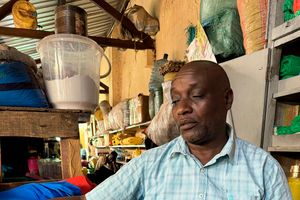Everything you need to know about blood donation

A donor donating blood at Regional Blood Transfusion Centre Kisumu County.
Dear doctor,
How often can I donate blood? Is it advisable to do it regularly?
Henry
Dear Henry,
Thank you for considering this noble activity! Blood donation saves lives.
It is done voluntarily to give to persons who require it following injury, or due to surgery, or following childbirth, or because they have an illness that causes their blood levels to become dangerously low.
Usually, blood donation involves giving about half a litre of whole blood. In a setting where equipment is available, apheresis may also be done. This is where the person is hooked to a machine that separates the different components of blood (red blood cells, platelets and plasma), extracts what is required at the time and returns the rest of the components to the person.
Since blood has different components, one unit of blood may actually benefit up to four different people because of the products that can be generated from it such as plasma, platelets, packed red cells and cryoprecipitate.
Sterile equipment is used during the procedure to avoid any infection to the person donating. For a healthy adult, donating half a litre of blood should not cause any health problems. The fluid lost is replaced within a few days and the red blood cells are replaced within about two weeks. Males can donate blood every three months and females every four months.
To donate blood, you need to be between 16 and 65 years old, weigh above 50kg and be in good health. The process includes registration, checking for haemoglobin levels, then the actual giving of blood, and a short recovery period, where you may also be provided with a drink. The donated blood also undergoes some tests for hepatitis, HIV among others, and you can collect the results later. There are further instructions on the Kenya Tissue and Transplant Authority portal and the Ministry of Health self-service portal.
Dear doctor,
I have had migraine headaches since I was a teenager, and now I am 32. I am tired of taking painkillers every now and then. Do they have a cure? Miriam
Dear Miriam,
Migraines are recurrent headaches that are usually throbbing in nature and tend to affect one side of the head. The pain may be moderate or severe. It tends to build up over several hours and may last for a few hours or up to several days. The headache worsens with movement and physical activity and may be associated with nausea and/or vomiting, light and sound sensitivity, and neck muscle pain. Some people experience an aura before, during or after a migraine headache. This is usually a visual experience (such as spots or bands of light or darkness), but some experience different sensory or muscle symptoms. Rarely, migraine may also be accompanied by serious symptoms like weakness or paralysis on one side, challenges with speech, problems with vision among others. It is not known exactly what causes migraines. The current thinking is that they arise from nerve activity that affects blood flow and leads to inflammation. There is likely to be a strong genetic component for migraines as 70 per cent of those with migraines have a close relative who has them as well. There are also some genetic conditions that have migraines as part of the symptoms.
Migraines may also be triggered by stress, too much or too little sleep, hormonal changes, strong smells, bright light, smoking, hunger, weather changes and some foods and drinks. It can also be triggered by head injury or other illnesses. The triggers are different from person to person.
It is advisable for you to be reviewed by a health professional to identify any underlying conditions and guide on the best course of treatment. Management of migraines is a combination of prevention by avoiding the triggers, using preventive treatment and treatment of the symptoms. There are different medications that may be used, depending on what is required to control the symptoms and manage others. Psychotherapy may also be used such as biofeedback and cognitive behavioural therapy.
Dear doctor,
My friend has been sickly for some time and sometimes even has difficulty walking. She was diagnosed with Myasthenia gravis. What is that?
Mark
Dear Mark,
Myasthenia Gravis is a rare auto-immune disorder, where the body’s immune system attacks the junction where the nerves and muscles meet, affecting communication coming from the nerves to the muscles. This causes muscle weakness that worsens when the individual is active and improves with rest.
There is fatigue and muscle weakness of specific muscle groups such as the limbs, the muscles around the eyes, the mouth and throat, which may be seen as difficulty walking, typing, writing or lifting the arms above the head, droopy eyelids, double vision, a tired-looking face, challenges speech, chewing and swallowing among other symptoms.
Sometimes the respiratory muscles may also be affected, which may be seen as difficulty breathing when lying down, or difficulty taking deep breaths so that the person has to take frequent, shallow breaths. In severe cases, the breathing may need to be supported by a ventilator.
The symptoms may be triggered or worsened by other illnesses, weather changes, menstruation, pregnancy, stress and some medications.
There are medications that can be used to manage the symptoms and suppress the immune activity. It is advisable to have regular follow-ups and utilise the treatment as prescribed to avoid flare-ups.
For most individuals with the disease, the worst symptoms are experienced during the first three years of the illness, with achievement of a steady state of the condition or improvement after that unless there are specific triggers encountered later.

